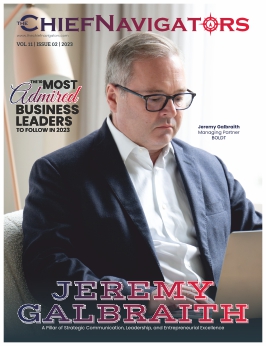Jeremy Galbraith: A Pillar of Strategic Communication, Leadership, and Entrepreneurial Excellence
The 10 Most Admired Business Leaders to Follow in 2023

Jeremy Galbraith, the Managing Partner at BOLDT, boasts an impressive career spanning 30 years, during which he has offered strategic communication counsel to renowned companies, organizations, governments, as well as world leaders, including Presidents and Prime Ministers. His expertise extends to engaging effectively with diverse stakeholders, managing critical business and political issues, and navigating through crises.
Jeremy’s client portfolio covers virtually every industry sector, and his counsel is highly sought after by leaders in both business and politics. Notably, he served as the CEO of Burson-Marsteller EMEA for a decade until 2017, overseeing a team of over 700 employees across 32 offices. Prior to that, he held the position of CEO at Burson-Marsteller Brussels.
Jeremy’s contributions to the field of strategic communication have not gone unnoticed. In 2012, he was honored with a SABRE Award for Outstanding Individual Achievement by PRovoke, a leading global communications publication. The Sunday Times and Debrett’s recognized his influence by listing him among the UK’s 500 most influential people in 2014. His entrepreneurial acumen was acknowledged when European CEO magazine named him Entrepreneur of the Year in the European PR industry for 2020, cementing his reputation as a distinguished figure in the world of strategic communication and leadership.
From Politics to Strategic Communication and Crisis Management
Jeremy didn’t originally plan to pursue a career in strategic communication but ended up in the field through a series of opportunities. Initially, Jeremy aimed to enter politics but decided not to when his party went into opposition at an inopportune time. He studied law, worked for a Member of Parliament (MP), and subsequently joined a lobbying company in Westminster, where he engaged in supporting companies in their lobbying activities, including meeting with politicians to seek to influence their decisions.
However, a career shift occurred when Jeremy was headhunted by Burson-Marsteller. This opportunity expanded his horizons to encompass a broader spectrum of strategic communications beyond direct political lobbying. He realized that to influence various processes, whether political or otherwise, a multifaceted approach was essential. This included using advertising, social media, organizing events, and employing research evidence – essentially adopting a political campaign model.
As Jeremy’s career progressed at Burson-Marsteller, he found himself increasingly involved in various issues, moving away from pure political engagement and toward crisis communication. His work covered diverse challenges, from assisting the International Cycling Union during the Lance Armstrong scandal to advising the Egyptian government following the MetroJet terrorist attack, as well as supporting Mikhail Khodorkovsky’s global campaign for his release from prison in Russia. Jeremy also worked with major companies and CEOs, emphasizing the importance of reputation in business and the significant impact of both positive and negative reputation.
The Power of Authentic Communication
Jeremy emphasizes the critical role of honest, authentic, and proactive communication regardless of whether he is advising companies, CEOs, Presidents, or Prime Ministers. The way in which one communicates significantly influences the public perception of them or their organization. He advocates an approach where individuals and organizations communicate openly and sincerely.
In his view, it’s essential to tell your story, but it’s equally important – whether you hold the position of a President, Prime Minister, CEO, or a Director of Communications – to address challenges, issues, and crises with honesty, transparency, and authenticity. This approach helps build trust and credibility, which are vital in the world of strategic communication.
Principles for Effective Team Guidance and Client Relationships
Jeremy’s leadership principles center around boldness, vision, challenging conventional wisdom, and displaying creativity. He emphasizes the importance of these traits in guiding teams and clients effectively. In addition, he highlights the significance of being forthright with clients, even when it involves disagreeing with them. This straightforward approach is essential for building long-term, trust-based relationships, as clients generally value honest, candid communication over a vague or insincere approach.
Business-First Approach
Jeremy maintains a discreet approach when it comes to discussing clients and doesn’t use them to promote his business. Instead, his focus is on prioritizing business strategy over communications, with the understanding that communication efforts should align with and support the broader strategic decisions made by companies. This discretion and commitment to the strategic aspect of business set his approach apart.
Transparency in Communication
BOLDT maintains a strict rule of complete transparency when it comes to communicating on behalf of clients. The team is committed to openly disclosing the identity of the client whenever they communicate externally. This transparency is considered essential to building trust and credibility with external stakeholders. Jeremy’s approach is rooted in the belief that hiding information or being less than transparent can exacerbate negative stories. Therefore, the emphasis is on openness and honesty to help clients manage their public image and reputation effectively. Most external stakeholders, in Jeremy’s experience, recognize and appreciate this level of transparency.
Hiring for Success
Jeremy values qualities like boldness, creativity, and a deep understanding of effective communication when looking to hire people. Academic qualifications or degrees in communication are not a primary concern; instead, he seeks candidates who possess these crucial personal qualities
In the consultancy world, there are distinct roles – running clients and running the business. Finding individuals who can excel in both of these areas is relatively rare. However, the most critical skill Jeremy seeks in potential team members is the capacity to serve clients effectively. This entails listening to clients, challenging their perspectives, and providing valuable advice.
Beyond the Headlines
Jeremy underscores the importance of recognizing that the role of communications is fundamentally about aiding a business, government, or any client in achieving its goals. It goes beyond simply generating press coverage. The key questions to ask are whether the communication efforts are genuinely influencing the way the business is perceived, how they affect the organization’s reputation, their impact on internal communications, their contribution to acquiring new clients, and their role in facilitating growth. In an ever-changing and disruptive world, the effectiveness of communication plays a critical role in helping entities adapt and thrive.
Insights in the World of Public Relations and Communications
Jeremy’s approach to inspiration is less about reading books on business strategy or strategic communication and more about citing individuals who have had a significant impact on his career and thinking. One such influential figure is Harold Burson, the founder of Burson-Marsteller, a prominent public relations and communications firm. Jeremy vividly recalls his first day at Burson-Marsteller in London in 1995 when Harold Burson himself called him, making a lasting impression. Throughout his more than 20 years at the company, Jeremy had the opportunity to work closely with Harold, and the interactions left a substantial imprint on his professional journey. Even in his nineties, Harold continued to engage and connect with his colleagues, as evidenced by the heartfelt email Jeremy received on the day he left the company.
While serving on the global board of Burson-Marsteller, Jeremy and Harold shared a strong alignment on virtually allissues. However, there was one notable point of disagreement between them: working with tobacco companies. Jeremy held the view that such collaborations were not in the best interest of the company for multiple reasons. This underscores the importance of ethical considerations in business decisions.
Listening and People-Centric Consultancy
Jeremy offers valuable advice about the importance of time and people in the consultancy business. In his career, he spent 23 years at Burson-Marsteller, a significant portion of his professional journey. However, he believes he should have established BOLDT, his own strategic communications firm, ten years earlier to focus more on creating a people-centric business. He asserts, “The important thing that most leaders forget is to listen. It is the most important communication skill. Listen to your clients, listen to what others are saying: only on that basis can you give advice.”
Consultancy, according to Jeremy, places people at the forefront of its operations. In contrast, the larger holding companies, like the one that acquired Burson-Marsteller (WPP), tend to prioritize margins over individuals. He humorously notes that “WPP” could be jokingly interpreted as “why pay people.” This approach misses the fundamental essence of consultancy, as the core of any consultancy business is its people—those who offer expertise, creativity, and client service.
Please visit: http://www.boldtpartners.com



